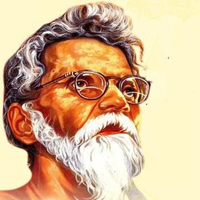Vinoba Bhave
Vinayak Narahari “Vinoba” Bhave was an Indian advocate of nonviolence and human rights. Often called Acharya, he is best known for the Bhoodan Movement. He is considered as a National Teacher of India and the spiritual successor of Mahatma Gandhi. He was an eminent philosopher.
Vinoba Bhave, byname of Vinayak Narahari Bhave, (born September 11, 1895, Gagode, Bombay Presidency [now in Maharashtra], India—died November 15, 1982, Wardha, Maharashtra), one of India’s best-known social reformers and a widely venerated disciple of Mohandas K. (Mahatma) Gandhi. Bhave was the founder of the Bhoodan Yajna (“Land-Gift Movement”).
Born of a high-caste Brahman family, he abandoned his high school studies in 1916 to join Gandhi’s ashram (ascetic community) at Sabarmati, near Ahmadabad. Gandhi’s teachings led Bhave to a life of austerity dedicated to improving Indian village life. Bhave was imprisoned several times during the 1920s and ’30s and served a five-year prison sentence in the ’40s for leading nonviolent resistance to British rule. He was given the honorific title acharya (“teacher”).
Bhave’s idea of the land-gift movement was conceived in 1951, while he was touring villages in the province of Andhra Pradesh, when a landholder offered him an acreage in response to his appeal on behalf of a group of landless Dalits (members of the lowest castes, formerly called “untouchables” and now officially named Scheduled Castes). He then walked from village to village, appealing for gifts of land to be distributed among the landless and relating the act of giving to the principle of ahimsa (nonviolence), which had been adopted by Gandhi. According to Bhave, land reform should be secured by a change of heart and not by enforced government action. His critics maintained that Bhudan Yajna encouraged the fragmentation of land and would thus obstruct a rational approach to large-scale agriculture, but Bhave declared that he preferred fragmented land to fragmented hearts. Later, however, he encouraged gramdan—i.e., the system whereby villagers pooled their land, after which the land was reorganized under a cooperative system.
Throughout 1975 Bhave took a vow of silence over the issue of the involvement of his followers in political agitation. As a result of a fast in 1979, he secured the government’s promise to enforce the law prohibiting the killing of cows (animals sacred to Hinduism) throughout India. Bhave’s original project and his philosophy of life are explained in a series of articles collected and published as Bhoodan Yajna (1953, reprinted 1957).

Vinoba Bhave
Date of Birth: 11 Sep 1895
Birth Place: Pen
Proffession: Indian philosopher
Nationality: Indian
Death: 15 November 1982, Pavnar


